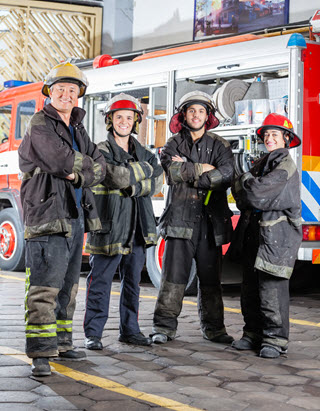Treatment for Military and
First Responder Trauma
You’re first on the scene.
You’re the first one to help.
The first one to protect.
You’ve seen and done it all.
Yeah, it was bad, but you try to move on. You try to forget.
You tell yourself you’re OK now.
It happened to other people. But it also happened to you.
Chris served on the USS Ashland in 2010 protecting international shipping lines from Somali pirates on the Arabian Sea and around the Horn of Africa. At times, the pirates refused to surrender or even attacked. Their boats, of course, would be blown to bits. Chris still remembers the agonizing screams of injured pirates, bodies floating in the water and pieces of pirate skiffs bobbing in the waves.
Terry goes ballistic when he’s driving on the freeway and somebody drives too closely behind him. In Iraq, convoys of trucks did the same thing. Back then, close equaled danger. For Terry, it still does.
Mike never drove in a convoy, but he did dive into a concrete pipe in Afghanistan whenever unexpected planes or helicopters flew over the base. There he would wait an hour or more, crammed into the tiny space with 20 or 30 other Marines, preparing for bombs to drop, praying for the siren announcing it was safe to leave. Now, whenever he’s crowded anywhere – at an amusement park, in an elevator, at a baseball game – his ears start ringing and his heart races with an overwhelming sense of dread.
Allison is tired of people asking her to describe the worst thing she’s ever seen as a paramedic. There are too many events to sift through: too many children to resuscitate after too many car accidents; too many gunshot wounds; too many dead bodies discovered after neighbors reported an incredible stench; too many lives she couldn’t save. She finds herself on the verge of tears all the time.
 You’ve tried to move on. Nothing is working.
You’ve tried to move on. Nothing is working.
You’ve talked about it. You’ve not talked about it. Part of you knows you did everything you could. The other part declares you guilty even though it doesn’t make any sense.
Why are you the one that made it out alive? What should you have done differently? What did you miss? If only you had … (fill in the blank), then the outcome would have been better.
The solution to trauma is EMDR therapy.
EMDR therapy works by creating new pathways in the brain that link what we know intellectually (e.g., we’re safe now, we did the best we could, it wasn’t our fault) to what we feel emotionally and physically (e.g., we’re in danger, we really messed up, there’s something severely wrong with us).
When these new links are created, the memory remains but the emotional attachment to it evaporates.
So instead of drinking too much, isolating yourself, avoiding crowds, or being angry or sad all the time, you can finally let go of your suffering and live the life you want.
Ready to heal your trauma?
If you’d like more information about how EMDR might help you, give me a call 720.837.3466 for a free 20-minute phone consultation, fill out the contact form below or e-mail me.
Don’t wait another day. It’s your turn now. It’s time to heal.

